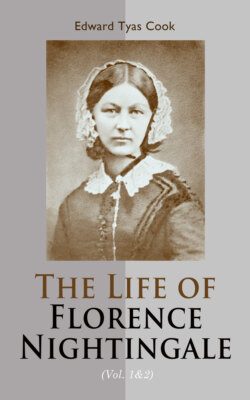Читать книгу The Life of Florence Nightingale (Vol. 1&2) - Edward Tyas Cook - Страница 45
На сайте Литреса книга снята с продажи.
CHAPTER IX
AN INTERLUDE
(1852)
ОглавлениеTable of Contents
Who would be free, themselves must strike the blow.—Byron.
The three months which Miss Nightingale spent at Kaiserswerth in 1851 were a turning-point in her career, but they were not immediately effectual in altering the tenor of her life. The battle for freedom was not yet completely won; but the “mountains of difficulty” in her way had been turned, and henceforth the resistance offered to her was but a rear-guard action.
* * * * *
A note of serenity, in marked contrast to the storm and distress of earlier years, now appears in some of her letters. She had firmly resolved on taking her life into her own hands; and at Kaiserswerth she had already served some apprenticeship. She was resolved no less firmly to follow up the advantage; and, though there were still to be some difficulties ahead, she could afford to be patient for a while:—
(To Miss H. Bonham Carter.) Umberslade, Jan. 8. Brussels Sprouts is at it already, I mean at correspondence. I mention it to show how little women's occupations are respected, when people can think that a woman has time to spin out long theories with every young fool who visits at her house. This place is grand—Inigo Jones, and Papa is content. … I like Dr. Johnson; but I can always talk better to a medical man than to any one else. They have not that detestable nationality which makes it so difficult to talk with an Englishman. I suppose the habit of examining organisations gives them this. … Poor Cassandra has found an unexpected ally in a young surgeon of a London hospital, a son of Dr. Johnson who sits next Papa at the table d'hôte. The account he gives of the nurses beats everything that even I know of. This young prophet says that they are all drunkards, without exception, Sisters and all, and that there are but two nurses whom the surgeon can trust to give the patients their medicines. I thought you would be pleased to hear how bad they are, so I tell you. Johnson is extraordinarily careful, but he does not strike me as having genius like Gully. The company is of a nature which would give Mama some hopes of me that I should learn “the value of good society” by the contrast. …
(To her Father.) May 12 [1852]. On my 32nd birthday I think I must write a word of acknowledgment to you. I am glad to think that my youth is past, and rejoice that it never, never can return—that time of follies and bondage, of unfulfilled hopes and disappointed inexperience, when a man possesses nothing, not even himself. I am glad to have lived; though it has been a life which, except as the necessary preparation for another, few would accept. I hope now that I have come into possession of myself. I hope that I have escaped from that bondage which knows not how to distinguish between “bad habits” and “duties”—terms often used synonymously by all the world. It is too soon to holloa before you are out of the wood; and like the Magdalen in Correggio's picture, I see the dark wood behind, the sharp stones in front only with too much clearness. Of clearness, however, there cannot be too much. But, as in the picture, there is light. I hope that I may live; a thing which I have not often been able to say, because I think I have learnt something which it would be a pity to waste. And I am ever yours, dear father, in struggle as in peace, with thanks for all your kind care, F. N.
When I speak of the disappointed inexperience of youth, of course I accept that, not only as inevitable, but as the beautiful arrangement of Infinite Wisdom, which cannot create us gods, but which will not create us animals, and therefore wills mankind to create mankind by their own experience—a disposition of Perfect Goodness which no one can quarrel with. I shall be very ready to read you, when I come home, any of my “Works,” in your own room before breakfast, if you have any desire to hear them.—Au revoir, dear Papa.
